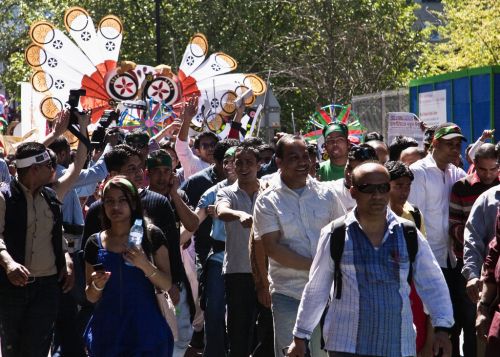Pohela Boishakh
Pohela Boishakh is the Bengali New Year. It is celebrated in Bangladesh and Indian state of West Bengal. Wherever there is a Bengali community Pohela Bishakh is a huge festivity. In Bengali word “pohela” means the first, and Baisakh is the first month in the traditional Bengali calendar.
Pohela Boishakh is celebrated on the 14th of April. According to the Bengali calendar the current year is 1419. Being clean is very important tradition. People have a bath and the whole house is thoroughly cleaned. People traditionally visit their cousins, friends and neighbours.
No Bengali New Year would be the same without Boshakhi fairs. They offer huge amounts of various food, toys, handicrafts etc. People also visit them to enjoy the traditional music and dance. There is a very famous music festival known as the Bangla Sangit Mela. It is organized in Kolkata by the Government of West Bengal.
 Rabindranath Tagore
Rabindranath Tagore
One the most spectacular Pohela Boishakh fesitivities is in the capital of Bangladesh Dhaka. The centre of local celebration is the Ramna Park. People traditionally gether under the banyan (banian) tree. For the occasion Chhajanat artist performs the song called “Esho, he Boishakh, Esho Esho” (“Come, O Boishakh, Come, Come”). The song was written by the famous Bengali poet Rabindranath Tagore (1861-1941). Similar party is held by students at the Institute of Fine Arts.
In Indian city of Kolkata people believe that the Pohela Bishakh is the best time to get married. Shop keepers try to use the occasion so they offer huge discounts on clothes.
Women traditionally wear saris made of white cloth with red border. Bengali men wear kurta and dhuti (dhoti). People often participate in processions held in the early morning hours of the first day of the new year.
 Pohela Boishakh procession
Pohela Boishakh procession
Pohela Bishakh is also the start of Bengali business year. There is a special puja that includes the halkhata (accounting book). Mantras are chanted. A priest draws shostik (Hindu swastika) on the halkhata.
Food is an important part of the Bengali New Year. People usually eat panta bhat (rice soaked in water), shutki (dried fish), fried Hilsa fish and achar (pickles).